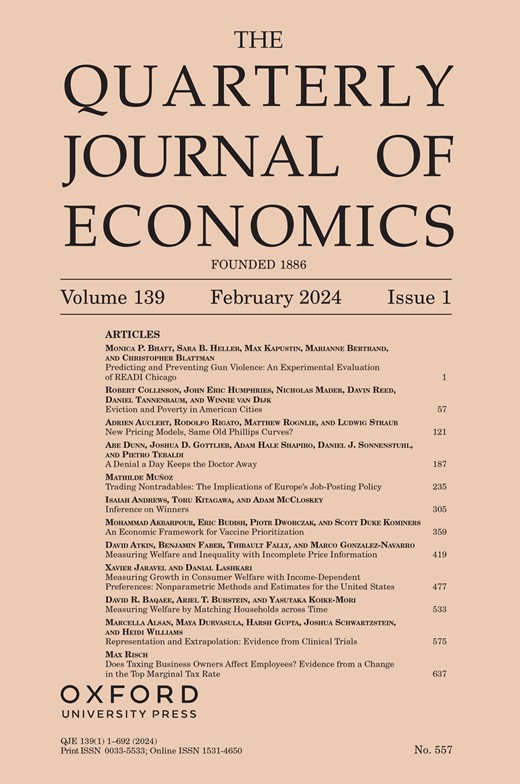选择简化:心理预算理论与朴素多样化*
IF 12.7
1区 经济学
Q1 ECONOMICS
引用次数: 41
摘要
我们发展了一个理论,说明代理人如何在品味、消费机会和价格冲击的情况下做出基本的多产品消费决策,而这些因素需要付出高昂的代价。我们确定,代理人通常通过将注意力限制在几个重要的考虑因素上来简化她的选择,这些因素取决于手头的决定,并以特定的方式影响她的消费模式。如果代理商的问题是选择许多具有不同可替代性程度的商品的消费水平,那么她可能会为更具可替代性的产品(例如娱乐)创造心理预算。在某些情况下,根据消费量指定预算是最优的,但当大多数产品都有大量替代品时,根据名义支出指定预算往往是最优的。相反,如果商品是互补的,那么代理商可能会选择一种固定的、未经考虑的产品组合,这与天真的多样化一致。如果代理商的问题是从多种产品中选择一种来满足给定的消费需求(例如,汽油或床),那么她通常会为该需求分配固定的金额。JEL代码:D01、D11、D14本文章由计算机程序翻译,如有差异,请以英文原文为准。
Choice Simplification: A Theory of Mental Budgeting and Naive Diversification*
We develop a theory of how an agent makes basic multiproduct consumption decisions in the presence of taste, consumption opportunity, and price shocks that are costly to attend to. We establish that the agent often simplifies her choices by restricting attention to a few important considerations, which depend on the decision at hand and affect her consumption patterns in specific ways. If the agent’s problem is to choose the consumption levels of many goods with different degrees of substitutability, then she may create mental budgets for more substitutable products (e.g., entertainment). In some situations, it is optimal to specify budgets in terms of consumption quantities, but when most products have an abundance of substitutes, specifying budgets in terms of nominal spending tends to be optimal. If the goods are complements, in contrast, then the agent may—consistent with naive diversification—choose a fixed, unconsidered mix of products. And if the agent’s problem is to choose one of multiple products to fulfill a given consumption need (e.g., for gasoline or a bed), then it is often optimal for her to allocate a fixed sum for the need. JEL Codes: D01, D11, D14
求助全文
通过发布文献求助,成功后即可免费获取论文全文。
去求助
来源期刊

Quarterly Journal of Economics
ECONOMICS-
CiteScore
24.20
自引率
2.20%
发文量
42
期刊介绍:
The Quarterly Journal of Economics stands as the oldest professional journal of economics in the English language. Published under the editorial guidance of Harvard University's Department of Economics, it comprehensively covers all aspects of the field. Esteemed by professional and academic economists as well as students worldwide, QJE holds unparalleled value in the economic discourse.
 求助内容:
求助内容: 应助结果提醒方式:
应助结果提醒方式:


